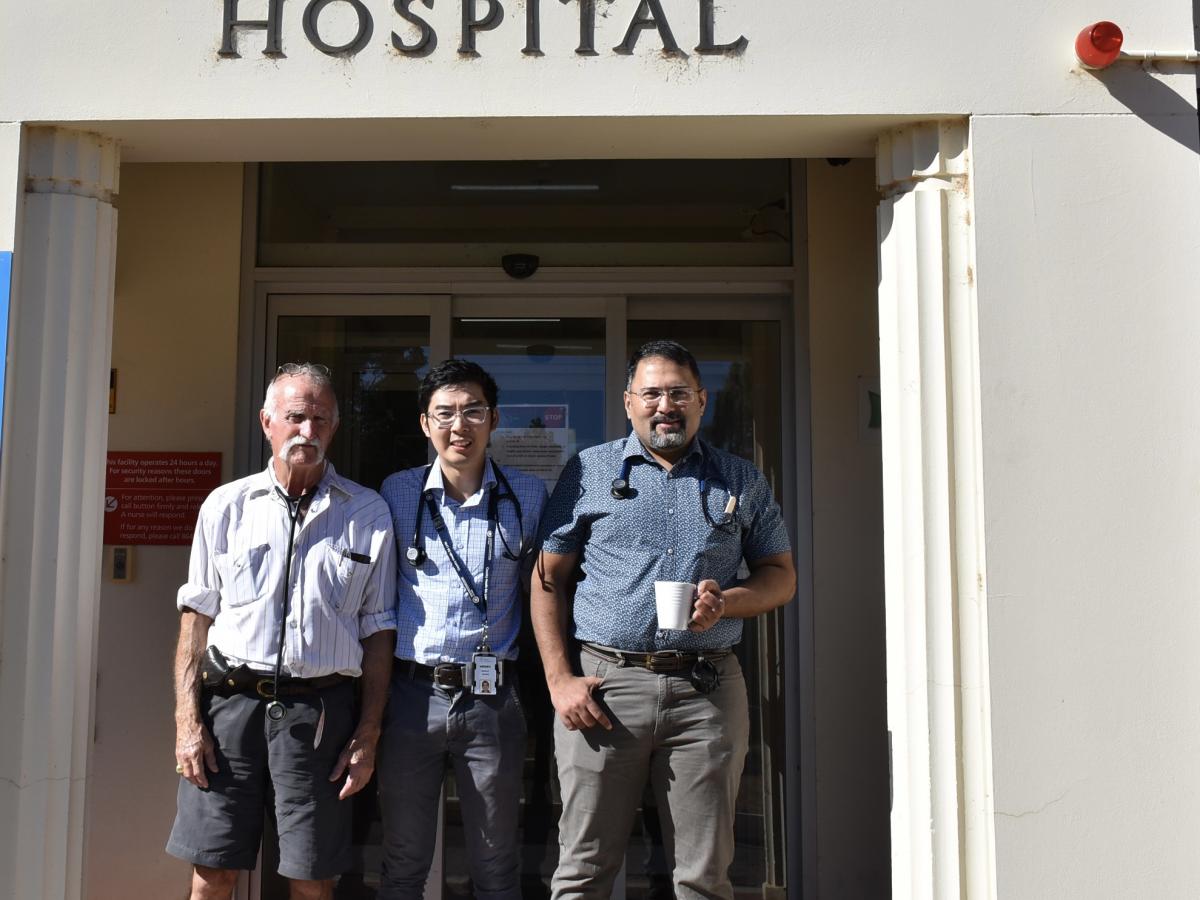Twenty years of improving rural health
The Adelaide Rural Clinical School (ARCS) is celebrating 20 years since its inaugural rural-placement program for medical students, and two decades of connecting University of Adelaide-trained medical professionals with country communities.

ARCS 2023 placement students Mitali Rawat, Zakia Saymontee, Lachlan Clarke, Alison Teubner, Elly Schoff, Mansa Sukheja, Emma Lane, and Eden Smith in Port Augusta.
“We are incredibly proud to have made 20 years, and this is a testament to the hard work and dedication of our staff and students. Their success has consolidated our reputation as a leader in medical education,” said the University of Adelaide’s Professor Lucie Walters, Director of ARCS.
Dr Henry Lam, a Rural Generalist Registrar in Port Augusta, is an ARCS alum and took part in Year 4 and 5 rural placements during his six-year medical course. He said the program is crucial to fixing the rural doctor shortage.
“Patients who live in rural and remote areas deserve the same level of care as their metropolitan counterparts, and initiatives like ARCS are necessary to help promote, train, retain and encourage future rural generalist doctors to address our ongoing rural workforce shortage issue, which has been a problem for decades,” said Dr Lam.
In 2003, ARCS saw 10 students participate in a year-long rural placement. The school now has more than 40 participants each year – accounting for at least a quarter of all University of Adelaide medical students.
The number of communities offering placements has also increased. ARCS placements in 2003 took place in Booleroo Centre, Port Augusta, Port Lincoln, Port Pirie and Whyalla, and the program has since expanded to the Barossa, Broken Hill, Ceduna, Clare, Cummins, Kadina, Mount Barker and Roxby Downs.
ARCS alumni are three times more likely to work in rural areas after graduation than their metropolitan-trained peers, with almost 70 per cent of rural-based graduates of the program working in country South Australia.

Dr Tony Lian-Lloyd, Dr Henry Lam and Dr Hussain Akbar.
Professor Walters said participants regularly engage with their communities beyond the doctor’s clinic.
“Our students become involved in activities such as sport and community events and school and kindergarten visits. This improves the supply of skilled medical practitioners who are responsive to the needs of rural people,” she said.
“This is of major importance to those rural communities being served by the additional rural doctors. Having more doctors working in rural communities may also lead to more rural training opportunities for medical students.”
Dr Lam said working within a small community is fulfilling in ways he didn’t expect.
“I’ve been able to take a more active role in caring for patients in the community, explaining their management plan, and even having the opportunity to follow up long-term and see the results of the care I provide,” he said.
“I’ve also developed hands-on skills for a wide range of medical specialties, and have learned to improve, adapt and overcome many clinical situations where resources are limited.”
ARCS rural placements are available to Year 4, 5 and 6 medical students, and the eight-week Kulpi Minupa program in Port Augusta was extended to Year 1 and 3 students this year.
Professor Walters hopes the school’s scope will continue to broaden.
“In the future, we hope to enable students to undertake their entire medical degree in a rural location,” she said.
Media contact:
Professor Lucie Walters, PhD, Director of Adelaide Rural Clinical School, University of Adelaide. Mobile: +61 0409 692 359, Email: lucie.walters@adelaide.edu.au
Dr Henry Lam, MBBS, PAG Anaesthetic RMO, Port Augusta Hospital and Regional Health Service. Mobile: +61 0431 026 231, Email: henry.lam@adelaide.edu.au
Johnny von Einem, Media Coordinator, The University of Adelaide. Mobile: +61 0481 688 436, Email: johnny.voneinem@adelaide.edu.au
